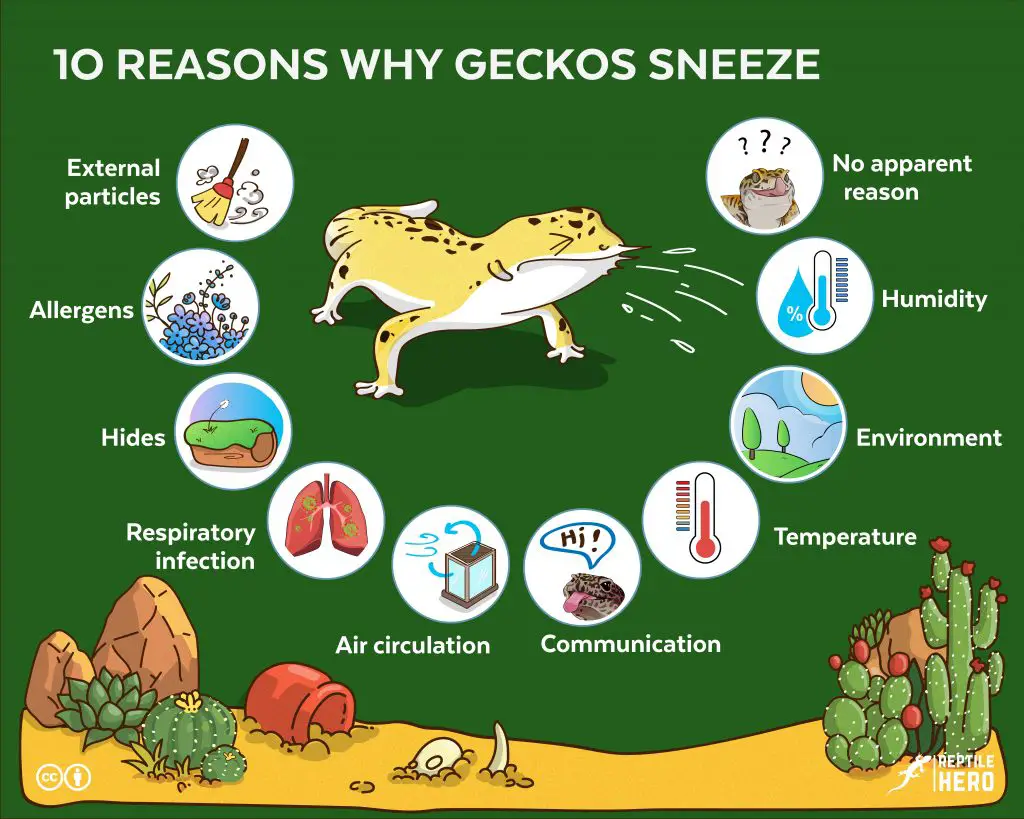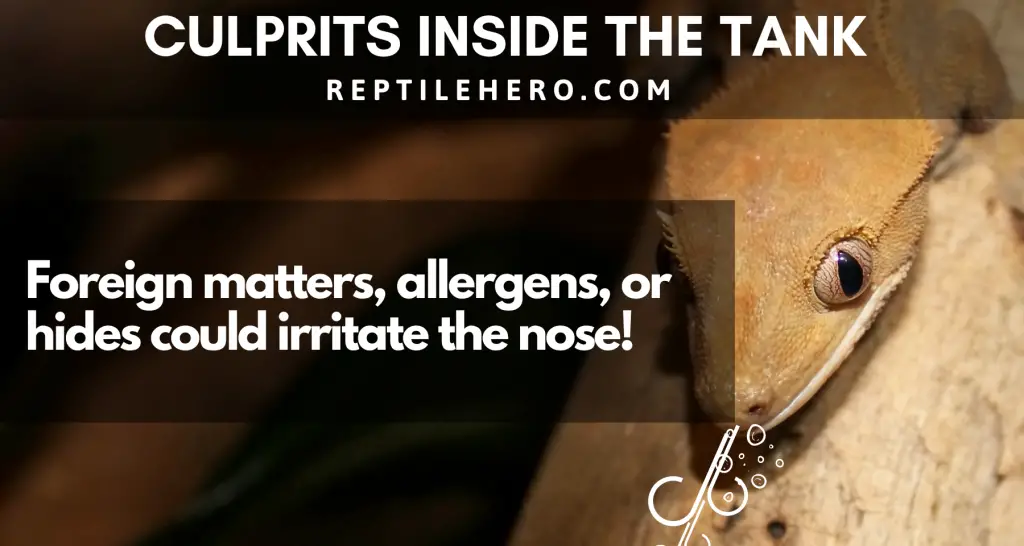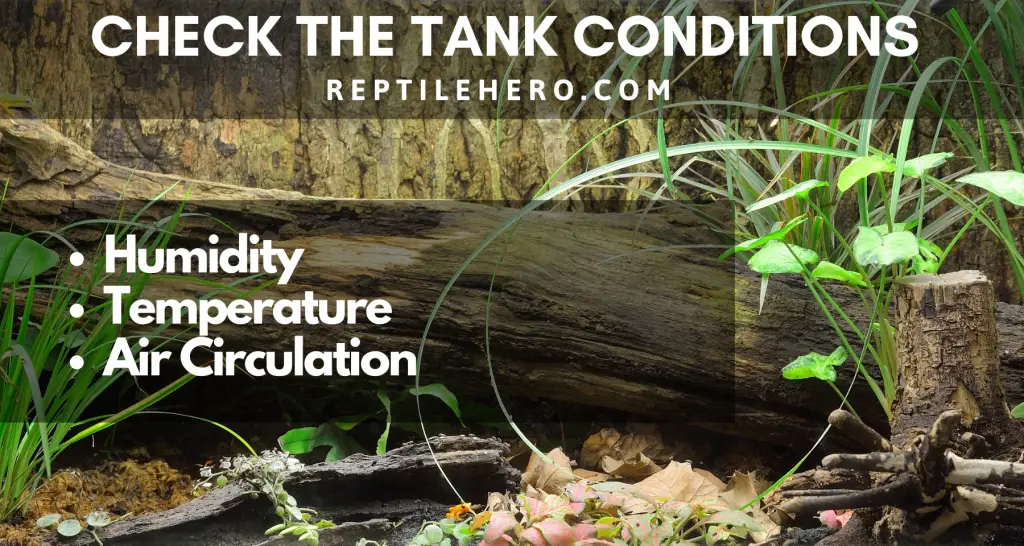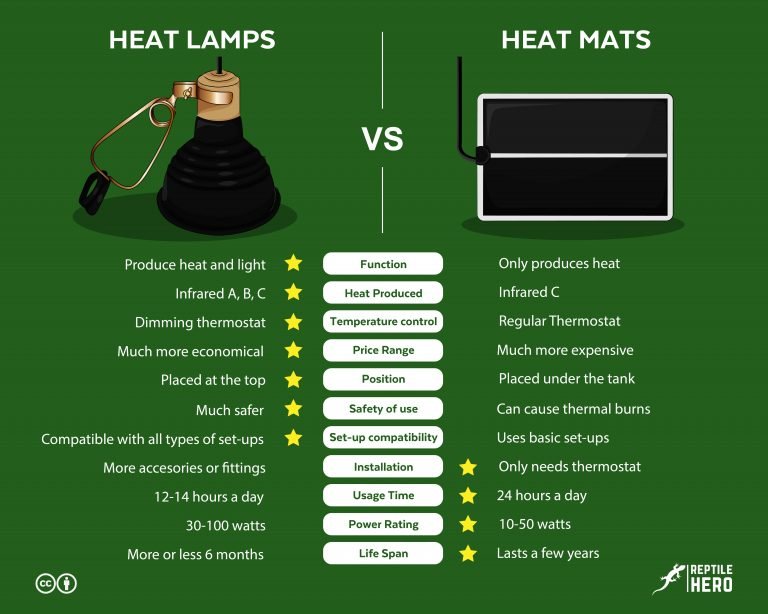10 Reasons Why Your Gecko Is Sneezing [With Solutions]
Have you ever witnessed your gecko sneeze out of the blue? Well, you might find this a cute yet random antic. But, despite this seemingly harmless act, a severe illness could underlie and threaten the welfare of your gecko.
A gecko may sneeze because of 1) the presence of particles and dust, 2) allergens, 3) inappropriate hides, 4) humidity, 5) temperature, 6) poor air circulation, 7) changes in the environment, and even 8) a means of communication. It can also indicate 9) a respiratory infection or 10) for no apparent reason.
Stay with us to know more about their sneezes.

10 Reasons Why Geckos Sneeze
You may have heard of someone in the act of releasing an uncontrollable air out of his or her nose and mouth. You may have even told him or her, “Bless you,” after the surprising and explosive incident.
What Is A Gecko Sneeze?
Similarly, geckos sneeze in the manner we do. Just like how the diaphragm and muscles at the back of our throat exert an effort to expel the irritants, their abdominals, chest muscles, and vocal cords all work together to relieve the body from the cause.
To help you visualize how a gecko sneezes, below is a short clip of a crested gecko caught in the act of sneezing.
While we may know full well what causes our sneeze, I will enumerate below ten typical reasons why your geckos say “Ah-choo!”
1. External Particles
One reason why gecko will sneeze as we do is if foreign particles and dust enter their nostrils and get up in the nose. These could even enter their mouth, which could tickle the throat area. Naturally, the irritant would trigger a natural biological response to dislodge it out of the body.
Some of the irritants that may be inside your gecko’s tank are:
- dander
- mold spores
- particles from decorations
- supplements like calcium powder
- a loose substrate in a bioactive setup
Though it could be unlikely, especially if you keep your leopard gecko’s enclosure clean, dust could trigger sneezes. Using paper towels as a substrate in the tank may entail regular misting and keeping them a bit damp. Doing so could help settle dust particles down instead of floating up in the air.
Aside from this, bathing your leopard gecko could make it sneeze. If you are not careful enough, some water might get into its nose. Thus, you must only bathe your pet when necessary, i.e., when it is having difficulties shedding, when a veterinarian instructs you to wash it, or when your gecko becomes noticeably dirty.
Another situation where a gecko could get water inside its nose is during drinking from the bowl. Popping its head into the water can introduce some fluid inside the nose, so expect it to sneeze once or twice.
Meanwhile, do you place CGD food on your crested gecko’s nose for it to lick off? You may have guessed it right. The food paste may cause irritation around its nostrils until a sneeze occurs for relief.
On a serious note, this feeding habit potentially introduces food traveling up to the nasal passage. As a result, it could cause breathing problems that a lot of owners might be unaware of. To avoid this situation from happening, you could leave a food bowl for your gecko to devour or spoon-feed when necessary.
Also, during shedding season, your leopard or crested gecko may sneeze due to a stuck or unstuck shed near its nose area in an attempt to dislodge it. One of my friends shared that her crestie rubbed its face on a tank accessory to remove a shed. However, the friction only caused irritation, leading to a sneeze.
To help your pet with a stuck shed, you can put it in a shallow warm bath. And you can remove the loosened skin by gently rubbing it using a soft-bristled toothbrush.
2. Allergens
If you know that you keep the tank in tiptop cleanliness, you can be confident that foreign matters are unlikely the culprit to your gecko’s sneezing. Now, you may be wildly wondering, “What if my gecko has an allergy?”
What you might be thinking could actually be true! Geckos, like us, could also have allergic responses to specific allergens—either airborne or ingested substances.
Now, it is time for you to figure out what exactly in the enclosure provokes the sneezes. One way for you to know prior to visiting your exotic veterinarian is by conducting a little experiment.
For instance, if you suspect that an accessory in the tank is causing the sneezes, you can put it near your gecko and test its response. Wait and see if this triggers sneezing. If it did, you might be better off without the decoration. Otherwise, look for other objects and repeat until you figure it out!
A few known allergens I have collected from different anecdotes include:
- soaps
- pollens
- beddings
- perfumes
- decorations
- scented candles
One of my friends found out that her crestie is allergic to the enclosure’s new substrate after she has remodeled it. She shared that whenever her pet is inside the tank, it sneezes. When they went to the veterinarian, everything was fine—clear and unobstructed nostrils. The doctor told her that it was an allergic reaction. Immediately, she stopped using the new substrate and reverted back to the old one.
3. Hides
Spending too much time inside one of its hides can be harmless, especially if your gecko finds the hide comforting. However, spending too much time inside a cool and moist hide may cause your pet to sneeze.
Excessive sneezing is not a good sign for geckos, so you must address the issue by rearranging the hides in the tank. I highly recommend having hides with the following conditions:
- a warm, dry hide on the warm end
- a warm, moist hide on the warm end
- a separate cool, dry hide on the cool end

4. Respiratory Infections
If you let out a sneeze or two, you probably would not be worried about anything serious.
Meanwhile, when you excessively and repeatedly sneeze in a short period, that is when you think that a common cold or an influenza infection is coming.
Similarly, a couple of sneezes coming from a healthy gecko should not be a concern. Nonetheless, this purportedly wholesome act could indicate a severe respiratory infection in your gecko.
Thus, you should be vigilant for other developing signs and symptoms your gecko would exhibit along with sneezing:
- lethargy
- bad breath
- breathing issues
- nasal discharges
- persistent wheezing
- clicking breathing noise
Along with the list above, seeing fluid or any crusty excretions around its nostrils or mouth is often an indication of advancing respiratory infection, like pneumonia in reptiles [1]. Once you observe more than one sign and symptom, I strongly recommend a quick veterinary visit for a respiratory system check.
You should keep in mind that respiratory infections and other serious illnesses in geckos cannot and should not be treated at home by yourself. Hence, you must refrain from believing home remedies in treating your gecko’s infection as you would need a professional to do so.
However, what you can temporarily do until the appointment is to leave the tank’s heat lamp on, as you should not lower the temperature too much with a respiratory-infected gecko.
5. Air Circulation
How does your leopard gecko’s enclosure look like? Did you provide a proper ventilation system for air to circulate?
When no proper ventilation is in the lower half of a tank, air fails to circulate. As a result, stuffy and congested air with moisture would rapidly form, causing geckos to sneeze.
This condition creates a perfect breeding ground for pathogens provoking your gecko’s sneezes. Since nobody wants to deal with pathogens and a sick gecko, you should address it immediately. A proper air circulation that helps keep the interiors dry can be achieved by [2]:
- an active ventilation, like electronic ventilators
- a passive ventilation, like a mesh that covers a part of or the entire lid
6. Humidity
As mentioned in one of our other articles, improper humidity level in the tank reddens the eyes of your geckos. However, this burden is not the only problem it could bring.
A humidity level below 60–80% triggers crested geckos to sneeze. Air in the enclosure may have become too dry for your pet, irritating its throat and nose for a sneeze to happen.
On the other hand, going way beyond the 30–40% humidity level needed by your leopard gecko potentially increases the risk of respiratory infections. These could initially manifest as sneezes with a “runny nose.”
The only workaround for either case is to properly monitor the humidity levels. If you still have an analog hygrometer, now is the best time to replace it with a digital one like this product on Amazon.
After all, an accurate reading would surely avoid future humidity-related health issues in your geckos.
7. Temperature
While you might have read that geckos may bury themselves to cool off from the warm environment, leopard geckos tend to sneeze due to the cold surroundings.
Like a high humidity level inside a leo’s enclosure, a low temperature from its needs increases its risk for respiratory infections. As a result, you have to follow these temperature recommendations until the sneezing resolves:
- ~ 80°F ground temperature on the cool end
- 88 to 93°F ground temperature on the warm end inside the warm, dry hide
- < 85°F air temperature on the warm end, 4 inches above the ground
- < 75°F air temperature on the cool end, 4 inches above the ground
Take note, you have to leave the under-tank heating (UTH) pad 24/7. Besides, you can turn off any overhead heating at night unless your room’s ambient temperature is particularly cool below 70°F.

8. Environment
When do you usually notice your geckos sneeze? When taking them outside the tank for playtime? Abrupt changes in the environment typically trigger a quick sneeze in geckos.
For instance, moving from a warmer and less humid tank to a cooler and more humid room or hallway could provoke the act. This is basically harmless as long as you do not give unnecessary stress to your reptile.
In my case, I find my leopard gecko almost always sneezing whenever I take it out of its tank for cuddles. I have had it long enough to know that this particular sneeze indicates no health concerns at all.
9. Communication
Aside from body language, geckos do not have any other means of communicating with us. Thus, a sneeze could possibly be one of their vocals to tell us something.
One of my geckos sneezes when it feels unhappy with a situation. Mainly, I find it sneezes a lot when I accidentally wake it up in the middle of its sleep. On the other hand, another gecko of mine let out a sneeze when I accidentally startled it. Luckily, it did not drop its tail off!
10. No Apparent Reason
If you have gone through all the reasons above yet found no answer, your gecko may be sneezing for no apparent reason. You do not have to worry, as geckos are typically known to randomly sneeze once in a while. You just have to make sure that you monitor your pet closely for any developing health issues!
In my case, I do have a few gecko sneezers. I have observed them sneeze once or twice in a row like how I usually do. Over the years, I found that sneezing has not led to any ill effects in my collection.
A Less Explored Reason: Releasing Salt
You may not have expected your gecko to sneeze, thus, heightening your concern for your pet. However, you might be surprised to know that this is actually common to other reptiles as well, especially iguana owners [3].
Often, many iguanas sneeze more productively than any other animal. With the lack of sweat glands, they are known as sneezing reptiles to expel excess salts excreted by salt glands found in their nasal passages [4].
Want to see how massive iguana sneezes are? Check out the short clip below!
Whether this mechanism applies to leopard and crested geckos is a debatable reason yet to be explored. While it is true that both also lack sweat glands like iguanas, the presence or absence of salt glands or similar-functioning organs in their body is not yet confirmed or denied.
Tell us your opinion about this by hitting us up!
Other Sounds Mistaken As Sneeze
If you have reached this part of the article, perhaps your gecko did not sneeze! You may want to explore and read five other sounds similar to sneeze.
1. Bark
Are you sure your gecko sneezed? One sound it produces similar to sneeze is a bark. The sound resembles a very short little sneeze, often too fast. Barking in geckos is a sign of stress.
2. Click
Geckos often produce clicking sounds for various reasons such as bonding, claiming territories, and communicating with other geckos. If your gecko lives a stress-free life under your care, you have nothing to worry about.
2. Yawn
Geckos do yawn. Typically, it does not have any sounds along with it. It also happens once or twice. Almost always, after a yawn, your leopard gecko would seem to be more relaxed and pleased, definitely not tensed or startled.
4. Throwing up
If what you have witnessed is a sound along with your gecko opening its mouth successively five times or more, it may have been throwing up. But, do not panic! Throwing up is pretty much common, especially when your gecko has eaten something too big or too much.
You only need to be concerned if you notice they are throwing up often or in a row. In this case, there could be a parasite or a virus that negatively impacts their appetite. This needs professional help.
5. Mating Calls
What was the sound like? Was it a jotted “we we we we we”? If you have a male gecko, it could have been a mating call instead of a sneeze. You would often hear this vocalization once the mating season starts.
Takeaways
Leopard and crested geckos may sneeze if foreign matters, allergens, and their hides in the enclosure have irritated their nose.
A serious concern for a sneezing gecko is an advancing respiratory infection. Full attention is needed if other developing signs and symptoms are manifesting.
Tank conditions such as air circulation, humidity, and temperature are also possible causes of sneezing in geckos. Always make sure to meet the required tank conditions.
If a leopard or a crested gecko is healthily living inside a clean tank, it may have sneezed as a means of communication or for no apparent reason.
Five common gecko sounds typically mistaken for sneezing include bark, click, yawn, throwing up, and mating calls.
Sources
[1] http://www.anapsid.org/rti.html

![Do Leopard Geckos Need Heat Mats? [Myth or Truth]](https://www.reptilehero.com/wp-content/uploads/2022/03/does-gecko-needs-heat-mats-cc-768x614.jpg)
![Ceramic Heater vs Halogen For Leopard Gecko: Which is Best? [11 Factors]](https://www.reptilehero.com/wp-content/uploads/2021/08/che-halogen-comparison-gecko-small-cover-infographic.jpg)


![3 Reasons Why Your Gecko Smells Bad [and 7 Tips]](https://www.reptilehero.com/wp-content/uploads/2021/04/G34_2-1-768x614.jpg)

